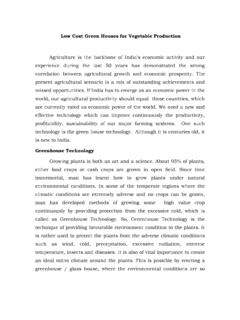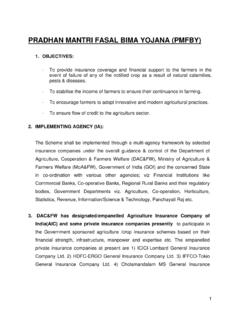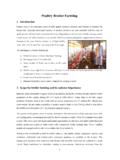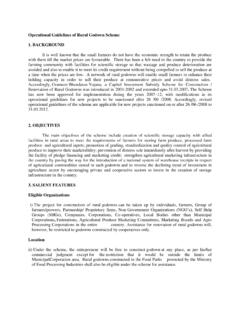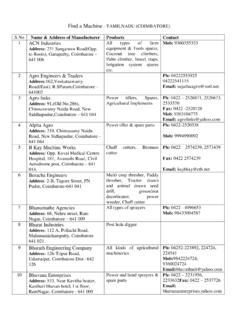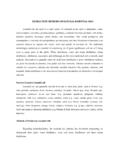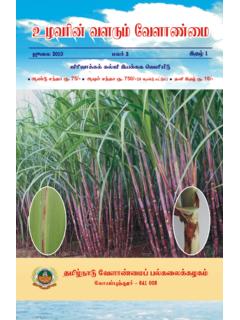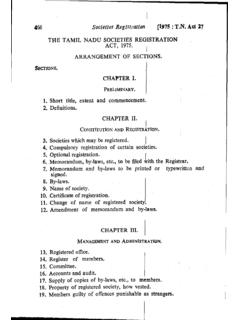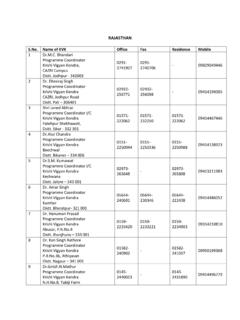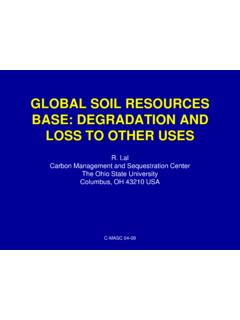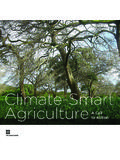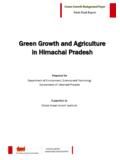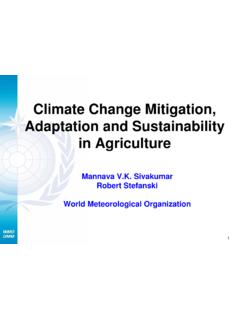Transcription of Management of Production Problems in Tropical …
1 ICAR Sponsored Short CourseManagement of Production Problems in Tropical fruit Cropsthrd 14 to 23 September 2005 EditorsDr. BalamohanDr. VijayakumarDr. K. Soorianathasundaram Dr. K. PoornimaDr. E. Vadivel1906-20051906-2005 Department of fruit CropsHorticultural College and Research InstituteTamil Nadu Agricultural UniversityCoimbatore - 641003 Course MaterialDepartment of fruit CropsHorticultural College and Research InstituteTamil Nadu Agricultural UniversityCoimbatore - 641003 Edited byDr. BalamohanDr. K. SoorianathasundaramDr. K. PoornimaDr. E. VadivelManagement of Production Problemsin Tropical fruit CropsICAR Sponsored Short Course(14th to 23rd September, 2005)Organised byDepartment of fruit CropsHorticultural College and Research InstituteTamil Nadu Agricultural University, CoimbatoreSponsored byIndian Council of Agricultural ResearchNew DelhiPrinted atSri Sakthi Promotional Litho Process54, Robertson Road, Puram, Coimbatore - 641 002 Tel: 0422-2450133 E-mail: OrganisationCourse Directors1.
2 Associates1. is one of the emerging countries having a strong footing in Agriculture,particularly in Horticulture. Though there are plenty of technologies to boost up theproduction, there are several other areas to be adequately addressed for sustainableproduction. With this in mind and to sensitize the teachers, researchers and extensionworkers, the Indian Council of Agricultural Research has given approval to conduct ashort course on Management of Production Problems in Tropical Crops from 14thSeptember to 23rd September, 2005 at the Department of fruit Crops, HC&RI, TNAU,Coimbatore. We gratefully acknowledge the ICAR for having selected our faculty forthis programme and for extending financial sincere thanks are due to Ramasamy, Vice-chancellor, TNAU, Coimbatorefor his encouragement and full support in conducting the short help rendered by the members of the faculty was immense and our thanks aredue to them.
3 Words are inadequate to express our gratitude for the sincere service bythe members of the Department of fruit Crops, without whom the training would nothave been are due to the various State Agricultural Universities and ICAR Institutesfor having nominated their scientists, extension workers and teachers to attend theshort course. We also acknowledge the resource persons who readily agreed to deliverthe technical inputs and spent their valuable time with the participants and providedthe core input for the training. Course Director and the EditorsPrefaceDr. E. VadivelDean (Hort)Dr. BalamohanProf. & Head (Fruits)Tamil Nadu Agricultural University1906-20051906-2005 India s diverse agro-climatic regions facilitate Production of wide variety of though India leads the world in Production of mango, banana, sapota and acidlime, in terms of productivity, it ranks far below than many countries.
4 With trade barriersbecoming narrower in the post WTO era, it is of paramount importance that the agriculturaland horticultural Production are kept at a higher level in a sustainable and competitivemanner despite the increasing pressure on land and water. Our present status of exportof fresh fruits is insignificantly low despite the climatic advantage we possess. Productionproblems and challenges faced by the grower need to be addressed constantly andurgently to keep Production levels from falling. It is timely that the short courseManagement of Production Problems in Tropical fruit Crops sponsored by ICAR isorganized at the Tamil Nadu Agricultural University to provide an update on variousproduction Problems of Tropical fruit crops like banana, mango, papaya, grapes, sapota,citrus, guava, jack, aonla etc. to the researchers, teachers and extension personnel ofhorticulture from different parts of I understand, the program covers all relevant aspects like Production strategiesincluding biotechnological approaches, micro irrigation and fertigation, pests and diseasemanagement, post-harvest handling etc.
5 I congratulate the contributors of the varioustopics and the editors for bringing out this compendium, which will not only be usefulto the participants of the short course but also to the students of horticulture, researchers,teachers of state agricultural universities, extension workers, private establishments,enthusiastic growers with scientific approach and various agencies involved inpromoting fruit Production . C. RamasamyForewordTamil Nadu Agricultural UniversityDr. C. RamasamyVice ChancellorCoimbatore - 641 003 IndiaDate: No. TitlesPage Agricultural Practices and Phytosanitation Standards in fruit Overview of Production Constraints and Management in Tropical fruit Constraints and Management in in Exportable Banana Production : National and International Problems in Grape and their of Production Constraints in of Production Constraints in Constraints and Management in Sapota and Constraints Management in Constraints and Management in Mandarin and of Production Constraints in Ber and in Production of fruit Crops in Arid and Approaches in Overcoming Production Constraints in fruit Farming in fruit in Micro-irrigation and Fertigation in fruit Crops and their Nutrient Norms - DRIS Approaches in fruit Production Constraints Using in Organic fruit Production and their to Manage Physiological Problems due to Nutrient Deficiencies in fruit Manipulation in Tropical fruit Crops to Overcome Physiological in Weed Management in fruit Pest Management in fruit Diseases of Banana and Papaya and their in Integrated Disease Management of fruit Management in
6 Banana and Management of Nematodes in fruit in Post Harvest Handling of concept of Good Agricultural Practices (GAP)has evolved in recent years in the context of a rapidlychanging and globalizing food economy and as a resultof the concerns and commitments of a wide range ofstakeholders about food Production and security, foodsafety and quality, and the environmental sustainabilityof agriculture. These stakeholders include governments,food processing and retailing industries, farmers, andconsumers, who seek to meet specific objectives of foodsecurity, food quality, Production efficiency, livelihoodsand environmental benefits in both medium and longterm. GAP offers a means to help reach those defined, GAP applies available knowledgeto addressing environmental, economic and socialsustainability for on-farm Production and post-produc-tion processes resulting in safe and healthy food andnon-food agricultural products.
7 Many farmers in de-veloped and developing countries already apply GAPthrough sustainable agricultural methods such as inte-grated pest Management , integrated nutrient manage-ment and conservation agriculture. These methods areapplied in a range of farming systems and scales ofproduction units, including as a contribution to foodsecurity, facilitated by supportive government policiesand Agricultural Practices (GAP) is a set of prin-ciples to make agriculture less dependent on chemi-cals, less aggressive to the environment and more so-cially conscious, therefore, more sustainable. GoodAgricultural Practices are procedures that improve con-ventional methods of Production , beginning with thechoice of the cultivation areas reaching until post-har-vest procedures with emphasis in the health, well-be-ing and safety of workers. They aim at healthy prod-ucts and at the preservation of the environment pro-moting the addition of value to the products of small,medium and large farmers.
8 These practices are the ba-Good Agricultural Practices and PhytosanitationStandards in fruit CropsE. Vadivel* and V. Panimalar**Dean, Horticultural College and Research Institute, TNAU, Coimbatore** Senior Research Fellow, Department of fruit Crops, HC & RI, TNAU, Coimbatoresis for other programs of stimulus to quality improve-ment, like the Hazards Analysis and Critical ControlPoints (HACCP) or for programs of promotion of agri-cultural certification such as Integrated fruit Produc-tion and other international protocols for quality present, GAP is formally recognized in the in-ternational regulatory framework for reducing risks as-sociated with the use of pesticides, taking into accountpublic and occupational health, environmental, andsafety considerations. The use of GAP is also beingpromoted increasingly by the private sector throughinformal codes of practice and indicators developed byfood processors and retailers in response to emergingconsumer demand for sustainably produced and whole-some food.
9 This trend may create incentives for theadoption of GAP by farmers by opening new marketopportunities, provided they have the capacity to Agricultural Practices for SelectedAgricultural ComponentsSoil1. The physical and chemical properties and functions,organic matter and biological activity of the soilare fundamental to sustaining agricultural produc-tion and determine, in their complexity, soil fertil-ity and productivity. Appropriate soil managementaims to maintain and improve soil productivity byimproving the availability and plant uptake of wa-ter and nutrients through enhancing soil biologicalactivity, replenishing soil organic matter and soilmoisture, and minimizing losses of soil, nutrients,and agrochemicals through erosion, runoff andleaching into surface or ground water. Though soilmanagement is generally undertaken at field/farmlevel, it affects the surrounding area or catchment2 Management of Production Problems in Tropical fruit Cropsdue to off-site impacts on run-off, sediments, nutri-ents movement, and mobility of livestock and as-sociated species including predators, pests andbiocontrol Good practices related to soil include maintainingor improving soil organic matter through the use ofsoil carbon-build up by appropriate crop rotations,manure application, pasture Management and otherland use practices, rational mechanical and/or con-servation tillage practices; maintaining soil coverto provide a conducive habitat for soil biota, mini-mizing erosion losses by wind and/or water.
10 Andapplication of organic and mineral fertilizers andother agro-chemicals in amounts and timing and bymethods appropriate to agronomic, environmentaland human health Agriculture carries a high responsibility for themanagement of water resources in quantitative andqualitative terms. Careful Management of water re-sources and efficient use of water for rainfed cropand pasture Production , for irrigation where appli-cable, and for livestock, are criteria for GAP. Effi-cient irrigation technologies and Management willminimize waste and will avoid excessive leachingand salinization. Water tables should be managedto prevent excessive rise or Good practices related to water will include thosethat maximize water infiltration and minimize un-productive efflux of surface waters from water-sheds; manage ground and soil water by proper use,or avoidance of drainage where required; improvesoil structure and increase soil organic matter con-tent; apply Production inputs, including waste orrecycled products of organic, inorganic and syn-thetic nature by practices that avoid contaminationof water resources; adopt techniques to monitor cropand soil water status, accurately schedule irrigation,and prevent soil salinization by adopting water-sav-ing measures and re-cycling where possible; en-hance the functioning of the water cycle by estab-lishing permanent cover, or maintaining or restor-ing wetlands as needed.
